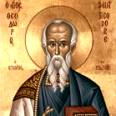 Our Venerable and God-bearing Father Theodore the Studite was a hymnographer and theologian as well as the abbot of the Monastery of St. John the Baptist in Studios, outside of Constantinople, during the ninth century.
Our Venerable and God-bearing Father Theodore the Studite was a hymnographer and theologian as well as the abbot of the Monastery of St. John the Baptist in Studios, outside of Constantinople, during the ninth century.
His great theological contribution, On the Holy Icons, was for the defense of icons during the Second Iconoclasm Period (814-842). He is also known for his writings and influence on monastic reform.
On our Accomplishing the Days of the Fast Gently and Readily in the Hope of Life Without End
Brethren and fathers, fasting is good if it possesses its own special characteristics, which are to be peaceable, meek, well-established, obedient, humble, sympathetic and all the other forms of virtue. But the devil hurries to suggest the opposite to fasters and to make them insolent, angry, bad-tempered, puffed up, so as to produce hurt more than gain.
But let us not be ignorant of his plans, but continue our path peaceably, gently, meekly and steadfastly bearing with one another in love, knowing that this is what is acceptable to God; for though you bend your neck double like a hoop and smother yourself with sackcloth and ashes, if these qualities are lacking to you, you would not be well-pleasing to him. Because while fasting batters and wastes the body, it clears the soul and makes it flourish.
“For as much as our outer nature is perishing,” it says, “by so much the inner is being renewed day by day.” And our light affliction, which is but for a moment, is working for us a far more exceeding weight of glory.
So that looking at the recompense, let us bear the toils of virtue with long-suffering, giving thanks to the God and Father who has qualified us to be partakers of the inheritance of the saints in the light. He has delivered us from the power of darkness and translated us into the kingdom of the Son of his love.
Do we not communicate each day of his immaculate body and blood?[1]
What could be sweeter and more filled with enjoyment than this, since those who partake with a pure conscience will obtain eternal life? Do we not converse each day with the godly David and the other Holy Fathers through taking in the readings? What could bring greater consolation to the soul? Have we not broken off contact with the world and with our relatives according to the flesh?
Again is anything more blessed or higher than this? For our citizenship is in heaven, from which we also eagerly wait for the Saviour, the Lord Jesus Christ, who will transform our lowly body that it may be conformed to his glorious body, according to the working by which he is able even to subdue all things to Himself. And so, my brothers, let us rejoice and be glad as we repudiate every pleasure.
“All flesh is grass, and all human glory like the flower of the grass.”
The grass withered and the flower faded, but the work of virtue endures for ever.
“Is anyone among you suffering?” as the brother of God says, “Let him pray. Is anyone sad? Let him sing psalms.”
Is anyone tempted by evil passion? — since the tempter is always at work — let him endure patiently as he listens to the one who says,
“Blessed is the one who endures temptation; for when he has been proved, he will receive the crown of life which the Lord has promised to those who love him.”
“If you know these things, blessed are you if you do them,” said the Lord,
to whom be glory and might, with the Father and the Holy Spirit, now and for ever and to the ages of ages. Amen.
1 This suggests that daily Communion was the norm for St Theodore’s monks. This would imply that during Lent the Liturgy of the Presanctified was celebrated every weekday, not just on Wednesdays and Fridays.
